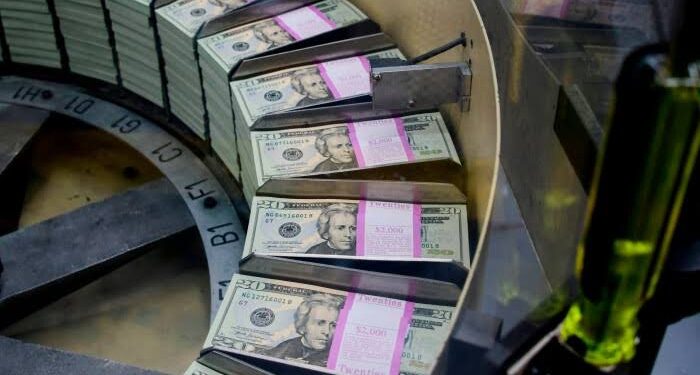U.S. stock futures wobbled, the dollar jumped and Hong Kong shares slipped from two-month highs on Tuesday as the U.S. and China set financial markets on edge with tit-for-tat tariffs that raised the spectre of a broader, damaging trade conflict.
“(The) trade war story remains alive and well and this has a lot further to play out,” said Shane Oliver chief economist at AMP in Sydney as prices skidded around on news headlines.
According to Reuters, S&P 500 futures , which had bounced in relief that Mexico and Canada cut deals to delay a U.S. tariff hit, swung to a 0.2% loss.
European futures fell 0.1% and the euro sank beneath $1.02 on nerves Europe gets dragged in.
Renewed selling pressure hit the Canadian dollar and Mexican peso .
The dollar index was last up 0.2% at 108.78.
Hong Kong’s Hang Seng (.HSI), opens new tab, which had scaled 2025 highs on expectations that China, too, would negotiate with U.S. President Donald Trump, pared gains to trade about 2% higher.
An additional 10% U.S. tariff on Chinese exports took effect at 0501 GMT, and minutes later Beijing announced it was investigating Google and imposing tariffs on imports of U.S. oil, coal, gas, cars and farm equipment from Feb. 10.
“The situation is still very fluid. I’m anticipating heightened uncertainty, dollar strength and USDCNH above 7.40,” said Jeff Ng, head of Asia macro strategy at SMBC in Singapore.
The offshore yuan slid to 7.3236 per dollar after the U.S. tariffs took effect and the more liquid Australian dollar , often seen as a proxy for the yuan, fell 0.7% to $0.6180.
Chinese markets remain shut for the Lunar New Year break, with investors focusing on where China fixes the currency trading band on Wednesday morning for clues to its negotiating stance.
Trump’s press secretary said he will speak with Chinese President Xi Jinping in the next few days, but unlike the North Americans, it is less clear where they will find common ground.
“It’s a totally different story because it (China) is an economic rival as well as political,” said Naka Matsuzawa, chief macro strategist at Nomura in Tokyo.
“Unless China makes huge concession economically, I really don’t think Trump will stop this tariff.”
UNCERTAINTY UNLEASHED
Trump’s shifting trade policies have made for a wild start to a week dotted with major company earnings. The Canadian dollar notched its biggest one-day range since the onset of the pandemic on Monday and cryptocurrencies have been roiled.
Bitcoin came under selling pressure and fell 3% to $98,750. Investor discomfort had safe-haven gold near record highs and bonds were under slight pressure, with benchmark 10-year Treasury yields up 3 bps to 4.57%.
ALSO READ:Uganda Starts Clinical Trial Of Vaccine For Sudan Strain Of Ebola
“The increase in policy uncertainty will be hard to put back in the bottle,” noted J.P. Morgan’s chief U.S. economist, Michael Feroli.
“For the Fed, the weekend’s developments will likely reinforce their inclination to sit on the sidelines and to remain below the radar as much as possible.”
UBS Group (UBSG.S), trounced forecasts with fourth-quarter profits and announced a buyback. BNP Paribas also beat earnings forecasts but lowered this year’s profit target.
Google (GOOGL.O), reports after U.S. markets close on Tuesday with scrutiny on its massive AI spending.
Oil prices, which had jumped on Monday, were falling and Brent futures touched a one-month low of $75.03 a barrel.












